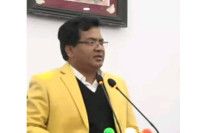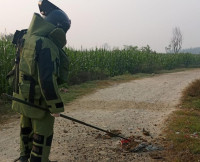National
Some 100 provisions in 43 Acts are discriminatory to women
If political parties don’t want to amend the discriminatory laws, then the constitution itself should be amended, experts say.
Binod Ghimire
Women rights have been enshrined as fundamental rights in the Constitution of Nepal. Article 38 ensures their proportional representation in all state mechanisms along with special opportunities in education, health, employment, and social security on the basis of positive discrimination besides guaranteeing them equal rights to property and family affairs.
The constitution has also made the state responsible for implementing these provisions through formulation of necessary laws within three years of its commencement. But even after over six years of the promulgation of the supreme law, dozens of laws, including those drafted in recent years, are discriminatory to women and contradict the constitution.
“There are 43 Acts that contradict the constitution when it comes to women’s rights,” Binda Pandey, a Standing Committee member of the CPN-UML and a member of the House of Representatives, told the Post. “These Acts need to be revised.” A group of cross-party leaders led by Pandey on April 8 urged Prime Minister Sher Bahadur Deuba to amend the Acts. They have also asked the prime minister to ensure that women’s representation doesn’t shrink in local governments as the ruling coalition are contesting the May 13 local elections as an alliance.
Section 17 (4) of the Local Level Election Act-2017 makes it mandatory for each political party to field a woman as candidate for either chief or deputy chief at the local level. However, the same law says the legal provision is applicable only when a party fields candidates for both the positions.
Women leaders and legal experts say the provision to give parties a leeway when they field only one candidate contradicts Article 38 (4) of the constitution which guarantees proportional representation of women in all state bodies. “Similar contradictions are there in 42 other Acts,” advocate Indu Tuladhar, who conducted a study of the different Acts for Justice and Rights Institute, a non-governmental organisation working on human rights advocacy, told the Post. “Our legislators have failed to internalize the constitutional provisions while making laws.”
Women comprise 51 percent of the total population of the country, according to the latest national census. However, no law has ensured women’s representation in proportion with the population. Although women have been provided 33 percent reservations in the civil service, it is lower than their actual population. Out of the total vacant positions in the civil service, 55 percent of seats are filled through open competition while 45 percent through reservations. And assuming that 45 percent as 100 percent, 33 percent of the seats have been allocated for women. Tuladhar said the existing Civil Service Act needs to be amended to ensure women 51 percent seats in the civil service.
Legal experts say some institutions like the Nepal Army have not even ensured 33 percent reservations for women. The House of Representatives Election Act, the National Assembly Election Act, the Right to Employment Act and the Education Act also have failed to follow the spirit of the constitution.
Though the Political Parties Act has mandated 33 percent representation for women in all party structures, parties have grossly ignored the provision.
Tuladhar even knocked Supreme Court doors demanding its intervention. Acting on her petition, a division bench of justices Deepak Kumar Karki and Manoj Kumar Sharma in March last year directed political parties to ensure at least 33 percent women representation in all the party structures. Though the parties, which held their general conventions recently, have 33 percent women representation in their central committees, their other mechanisms like office-bearer bodies or standing committees have only symbolic representation of women.
The CPN-UML has only two women among its 19-member office bearers while the Nepali Congress has only one woman among its 13 office bearers. “While the patriarchal mindset across parties is largely responsible for the poor representation of women, I also see women leaders failing to exert enough pressure on their party leaderships,” said Tuladhar.
Legal experts say those who drafted the constitution themselves are flouting it. Mohan Lal Acharya, an executive director at the institute, claimed 100 provisions in the 43 Acts need immediate amendment in line with the constitution. “The state cannot leave the fundamental rights unimplemented,” he told the Post. “If the parties don’t want to revise the discriminatory Acts, they should amend the constitution itself.”




 24.09°C Kathmandu
24.09°C Kathmandu















